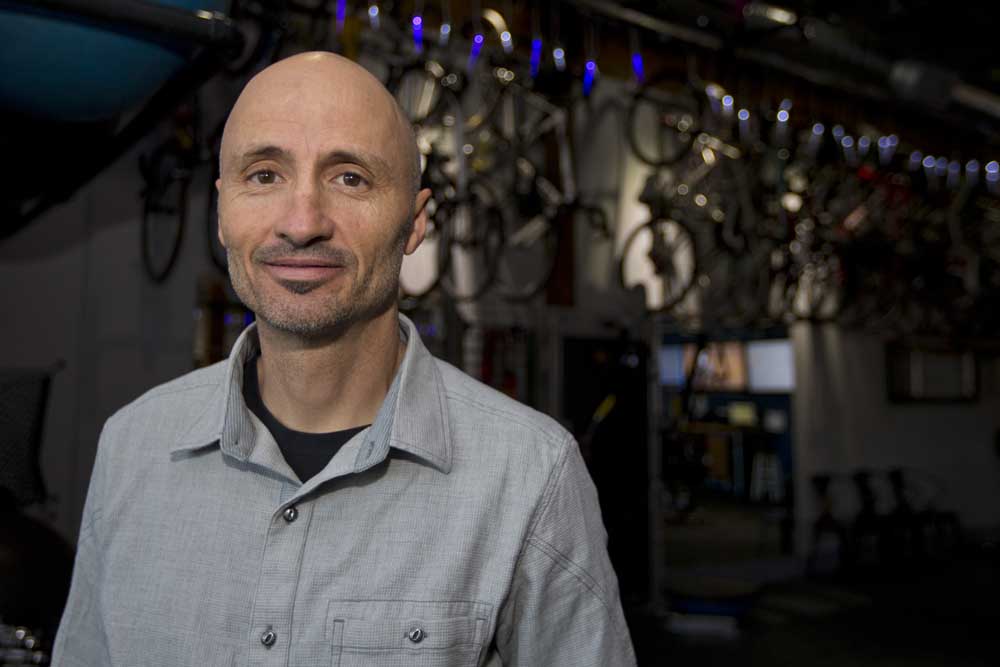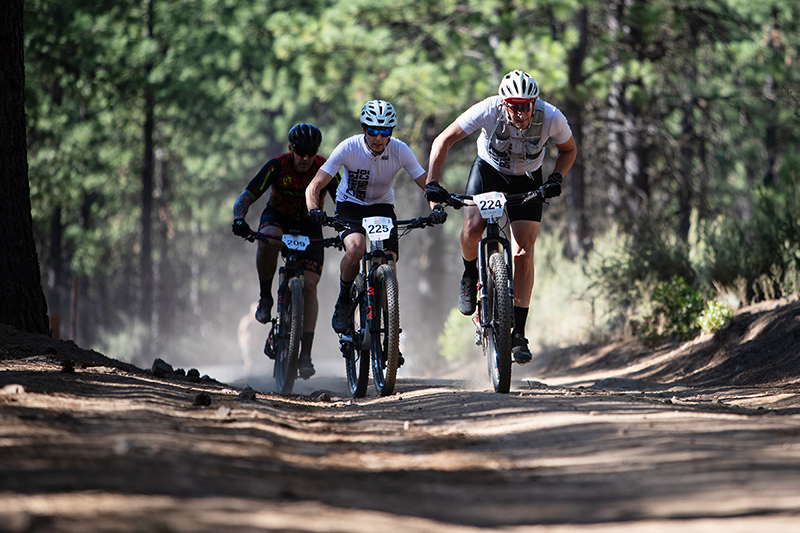As many other events fade away, organizers are confident the Cascade Cycling Classic will continue
Published 12:00 am Sunday, April 29, 2018

- Cascade Cycling Classic race director Bart Bowen. (Bulletin file photo)
One could almost hear the collective groan of bike racing enthusiasts when it was announced recently that the Cascade Cycling Classic was canceled for this year.
Here we go again.
Trending
Would the Cascade — which was known as North America’s longest-running stage race until the April 17 announcement — become the latest in a growing line of pro road cycling events to fold?
The answer from organizers and racers alike is a resounding no.
Most believe the CCC, which plans to return in 2019, has what some of those failed races do not — the long-standing support of a community that loves the event and loves cycling.
Roger Worthington, owner of Worthy Brewing in Bend, announced that Worthy plans to remain the Classic’s title sponsor in 2019, as was the plan for 2018. The race was not canceled due to lack of financial backing, but due to the lack of time for the planning that goes into the event as the race changed ownership and format, according to new race director Bart Bowen.
“Honestly, I’m a little bit bummed,” says Bend pro bike racer Dillon Caldwell, who recently signed a contract with the pro continental team 303 Project, based in Boulder, Colorado, and was planning to race Cascade this year. “I was super excited about the new race format and excited myself to come back to Bend for it. But a lot of the sponsorship has committed to staying. They want the event to come back. I have no doubt that will happen.”
Still, it is hard to ignore the current dire state of U.S. pro road cycling, and therefore not wonder about the future of the Cascade, which would have made its 39th running in late May. The National Racing Calendar, which included the major USA Cycling road races, once listed more than 50 events. Now renamed the Pro Road Tour, it lists only 20 events for this year.
Trending
Notable North American races that have folded in recent years — mostly due to lack of sponsorship — include the Philadelphia International Cycling Classic (1985-2016), the USA Pro Challenge in Colorado (2011-2015), the Tour of Alberta (2013-2017), the Tour of Georgia (2003-2008) and the Tour of Missouri (2007-2009).
Those races operated on much bigger budgets than the Cascade and typically had a life cycle of four to five years because they were so sponsorship driven, according to former Cascade race director Chad Sperry. A lower-tier race like Cascade can run on a blend of sponsorship and registration fees, Sperry added.
According to Pat Malach of Cycling News, the Tour of Utah is one of the few races that has returned successfully after being postponed for one year. The Utah race started in 2004, was postponed for lack of sponsorship in 2007, and has been staged every year since.
But lower-tier pro races have faded as well, including the Tour de Toona in Pennsylvania (1987-2011, no race in 2009), the Merco Cycling Classic in California (1993-2013), and, here in Oregon, the Mt. Hood Cycling Classic (2002-2013).
Sperry, who is based in Redmond, was also the race director for Mt. Hood. He says that sponsorship for that event started to wane after the collapse of the economy in 2009.
“With (Hood River, home base for the Mt. Hood Cycling Classic) being such a small market, we just couldn’t do it,” Sperry explains. “Bend is over 10 times the size and, I’ll be honest with you, is a more passionate community as a whole for cycling than what Hood River was. When it comes to the funding and the support, Mt. Hood is not anywhere in the same league as Cascade as far as having Bend to support it.
“The CCC was the longest-running pro race in the nation for a reason, and that’s because of the community behind it. I think that’s what gives it a solid opportunity to come back, and it’ll be an outstanding event.”
Still, the cancellation of the 2018 Cascade added more frustration for top U.S.-based cycling teams, such as Holowesko Citadel, which had planned to use the Central Oregon race as preparation for bigger races. Robin Carpenter, who raced for the team the past two years, won the overall title at the CCC in 2016 and 2017.
“Yes, it’s a big disappointment for us,” says Thomas Craven, chief sports director for Holowesko Citadel. “I certainly hope it comes back. We have a lot of history with the event and we always enjoy Bend and the race.”
The team recently returned from a series of races in France. Holowesko Citadel and other top U.S.-based teams often express exasperation that the United States does not support pro bike racing like Europe does.
“It’s part of their culture (in France) but I find it very frustrating that the ‘greatest nation on Earth’ can’t pull off a yearlong schedule of races that are challenging, exciting and just plain-old fun to do,” Craven says. “We had a blast racing in France and every event went off like clockwork. So, if they can do it, we sure as hell can.”
Over the years the CCC has hosted a number of pro riders who either were or became famous — namely, Lance Armstrong, who won the race in 1998.
Last year, Sperry stepped down as race director of the Cascade Cycling Classic after 11 years. The Mt. Bachelor Sports Education Foundation had operated the CCC as a fundraiser, but increasing costs, traffic concerns and other conflicts prompted the foundation to look for another owner. Last December, Visit Bend, the city’s tourism organization, stepped in as the race’s main stakeholder, and Bowen, of Bend-based Bowen Sports Performance, took over as race director.
Initial plans called for continuing the race in 2018 without interruption. However, Bowen and Visit Bend concluded that a one-year break would be in the best interest of the race, and they announced the cancellation of the 2018 event. Bowen says organizers were trying to plan in six months for an event that typically requires a full year of preparation. The race was scheduled for May 31-June 3, instead of its traditional mid-July dates.
“There’s a lot of things that have taken a year off,” says Bowen, a former pro rider who won the CCC in 1993. “We have to look at this in a positive light and say OK, we’re making some big changes. There was a compressed timeline to make those changes, and let’s be realistic. Let’s give ourselves a chance to succeed and really have the event that we want to have.”
Among those changes are a renewed commitment to amateur and junior racing. Bowen is planning for the 2019 Cascade to consist of eight or nine race categories, a significant increase from the 2017 race’s three categories: pro men, pro women, and Category 2 men.
“The pro category will still be very strong,” Bowen says. “We’re looking to try to bring a junior element to the race. And also get the masters back in the fold.”
For the 2019 event, Bowen is planning two road races, a technical time trial, a revised downtown Bend criterium and a circuit race. The new Tumalo Road Race, he says, will include some dirt and gravel riding, a cycling trend that is surging in popularity.
Meanwhile, through his company, Breakaway Promotions, Sperry is organizing gravel grinder races, including the High Desert Gravel Grinder taking place Sunday in Bend.
“You’re seeing more riders taking their road bikes off-road,” Sperry says. “People are looking for an alternative, some more adventure, quieter roads, less traffic. I think that’s where Bart has some really good ideas to kind of breathe some fresh life into this. He was willing to do some stuff that in 11 years I never attempted or tried. Ten years ago it was blasphemous to take your $10,000 road bike on gravel. It was just unheard of. And now it’s kind of the trend.”
Caldwell says for the Cascade and events like it, offering more amateur and junior categories and giving those racers courses that they want is crucial for sustainability of such events.
“I think this event, with Bart’s different ideas, is in the interest of that new model of racing,” says Caldwell, 28, who raced for the U.S. national team in the CCC last year. “That return to focus on community, junior support, and women’s racing, and all those aspects of racing that weren’t necessarily seeing as much benefit as they should have in the past.”
Caldwell says that U.S. racing is experiencing a widening gap between the top-level pro events (like the Tour of California and the Tour of Utah) and lower-level pro races, like the Cascade. The best way forward, he contends, is for races like the CCC to invest in more amateur and junior opportunities.
“I think that model is the future of American racing,” Caldwell says, “and I think people are already showing that they’re fired up and excited about that.”
— Reporter: 541-383-0318,
mmorical@bendbulletin.com








